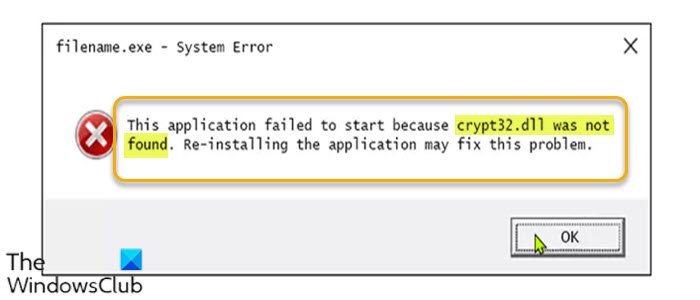The following are the main culprit to this error-
Crypt32.dll has got unregisteredRegistry problem.Virus or malware infection.Hardware failure.
It’s also known that some of the variants of this error can be caused by issues with media player updates. Below are some of the known variants or instances of this error; Regardless of the instance of this error you have encountered, the solutions presented in this post apply.
What is crypt32.dll?
The CRYPT32.DLL, otherwise known as the Microsoft Cryptographic library, is the module that implements many of the certificate and cryptographic messaging functions in the CryptoAPI. Both the Windows client and Windows Server Operating Systems ship with this library. However, the different versions of this DLL provide different capabilities.
How do I repair Windows 10 missing files?
Most Windows 10/11 users; if not all, would have every now and then, over time, and usage encounter issues related to missing or corrupt system files. This issue is no cause for alarm because if you are wondering how to fix/repair these missing DLL files issue, the Windows OS ships with two main native tools viz; System File Checker (SFC) and Deployment Image Servicing and Management (DISM) that help you carry out the repairs on your own without losing any data.
Crypt32.dll not found or missing
If you’re faced with this Crypt32.dll not found or missing issue, you can try to reinstall or repair the app and see if that helps – else try our recommended solutions below in no particular order and see if that helps to resolve the issue. Let’s take a look at the description of the process involved concerning each of the listed solutions. Before you try the solutions below, check for updates and install any available bits on your Windows device and see if the error reappears. Also, as indicated on the error prompt (if applicable), you can try reinstalling the program that’s triggering this error.
1] Run full system AV scan
A malware infection might have modified this particular dll file, consequently triggering the Crypt32.dll not found or missing error on your Windows 10/11 computer. In this case, you can run a full system antivirus scan with Windows Defender or any reputable third-party AV product. Also, in severe cases, you can run perform Windows Defender Offline Scan at boot time or use bootable AntiVirus Rescue Media to recover your system if somehow your computer is failing to boot. Also, as some affected users reported, check if your antivirus software is scanning the %Windir%\SoftwareDistribution\ folder as the files in that folder could be interfering with the scanner and consequently triggering this error. In this case, you can disable the AV software – if that resolves the issue, you can simply add that folder to AV exclusion list. If you’re running a third-party security software, refer to the manual on how to exclude folders/files from AV scan.
2] Run SFC and DISM scan
This solution requires you to run an SFC scan and see if that helps. If not, you can run a DISM scan or try the next solution.
3] Restore crypt32.dll file
If you have accidentally deleted the crypt32.dll file from your system, you can try and restore the file from Recycle Bin. You can also restore this file by logging into another working Windows computer that has been recently updated, navigate to the C:\Windows\System32\ folder and locate, copy the file to a USB drive, then plug the drive to the problematic PC, navigate to the exact folder, then paste the file in that location.
4] Re-register DLL files
This solution requires you to re-register the crypt32.dll file and see if that helps.
5] General fix for missing DLL files errors
Since this is a case of DLL missing or not found errors, you can try this general fix for missing DLL files errors and see if the issue will be resolved. If not, try the next solution.
6] Perform Reset This PC, Cloud Reset or In-place Upgrade Repair Windows
If nothing has worked so far up to this point, you can try Reset This PC, or Cloud Reset to reset every Windows component. You may also try In-place Upgrade Repair and see if that helps. Any of these solutions should work for you!
How do I fix sqlite3.dll missing error?
PC users that encounter the sqlite3.dll file missing error on their Windows 10/11 computer can try a number of fixes which includes;
Restore/replace the sqlite3.dll file with a healthy copy from another working Windows PC.Run a full virus/malware scan of your entire system.Perform System Restore to undo recent system changes.Reinstall the program that uses the sqlite3.dll file.Update the drivers for hardware devices that might be related to sqlite3.
Related post: Fix amd_ags_x64.dll missing error.

